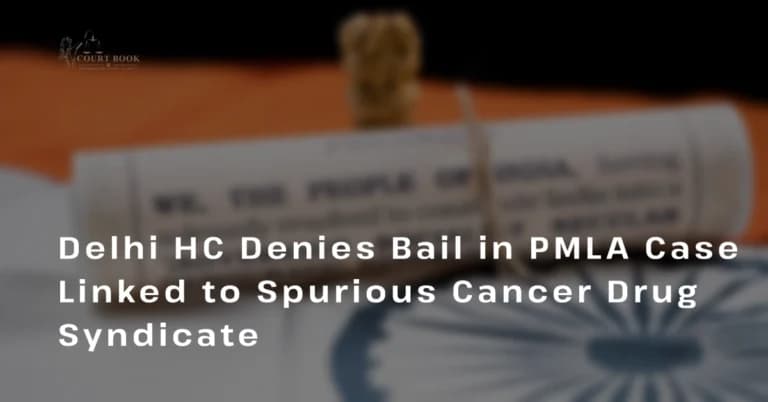The Delhi High Court recently denied bail to Lovee Narula, accused under the Prevention of Money Laundering Act (PMLA), 2002, for his alleged role in a syndicate distributing counterfeit anti-cancer drugs. Justice Chandra Dhari Singh emphasized the gravity of the offence, stating, “The applicant is part of an established crime syndicate... supplying spurious life-saving medicines, which poses severe risks to public health.”
Key Grounds for Bail Rejection
1.Seriousness of the Offence and Syndicate Involvement:
Seriousness of the Offence and Syndicate Involvement:
The court noted the applicant’s involvement in a coordinated network that procured empty vials, manufactured fake drugs, and sold them to cancer patients. The Enforcement Directorate (ED) alleged that Narula transferred over ₹42 lakh to co-accused Viphil Jain and ₹12.97 lakh to Neeraj Chauhan for purchasing spurious Keytruda and Opdyta injections.
“The offence extends beyond economic harm—it endangers lives. The applicant’s role in laundering proceeds of crime cannot be trivialized,” the court observed.
Read Also - Karnataka HC Pauses SC/ST Act Case Against Infosys Co-Founder Kris Gopalakrishnan and 17 IISc Faculty
2.Inapplicability of ₹1 Crore Threshold Exemption:
Inapplicability of ₹1 Crore Threshold Exemption:
Narula argued exemption under Section 45 PMLA’s proviso, claiming the proceeds of crime attributed to him (₹7.45 lakh) fell below the ₹1 crore threshold. The court rejected this, stating:
“The entire laundering scheme exceeds ₹1 crore. The applicant’s role must be viewed in the context of the syndicate’s collective operations.”
3.Compliance with Section 19 PMLA:
Compliance with Section 19 PMLA:
The ED’s arrest was challenged for lacking “reasons to believe” under Section 19. The court cited Senthil Balaji v. State (2023), where the Supreme Court upheld that arrests require material evidence. Here, the ED provided transaction records, WhatsApp chats, and Narula’s own admissions during custodial interrogation.
Read Also - Madhya Pradesh High Court Fines State Government for Alleged Violation of Land Acquisition Act
4.Evidentiary Value of Section 50 Statements:
Narula claimed his arrest relied solely on co-accused statements. The court referenced Abhishek Banerjee v. ED (2024), affirming that statements under Section 50 PMLA are admissible. It noted:
“The ED’s case rests not just on statements but on financial trails and digital evidence showing the applicant’s active role.”
5.Burden of Proof Under Section 24 PMLA:
The court highlighted Section 24, which presumes proceeds of crime are tainted unless rebutted. Citing Prem Prakash v. ED (2024), it stressed that foundational facts—existence of scheduled offences, proceeds of crime, and the accused’s involvement—were established. Narula failed to disprove his role in laundering ₹7.45 lakh from counterfeit drug sales.
Triple Test and Risk of Tampering
The court applied the “triple test” for bail:
- Flight Risk: Narula’s financial resources and prior criminal history (hoarding medicines during COVID-19) indicated a risk of absconding.
- Evidence Tampering: With 35 witnesses, including vulnerable patients, the court feared witness intimidation.
- Reoffending: The syndicate’s organized nature suggested a likelihood of continuing illicit activities if released.
Justice Singh concluded that Narula failed to satisfy Section 45’s twin conditions: proving innocence and unlikelihood of reoffending. The court stressed, “Economic crimes impacting public health demand rigorous scrutiny. Bail cannot be granted mechanically.”
Case Reference: Lovee Narula v. Directorate of Enforcement (BAIL APPLN. 3808/2024)














